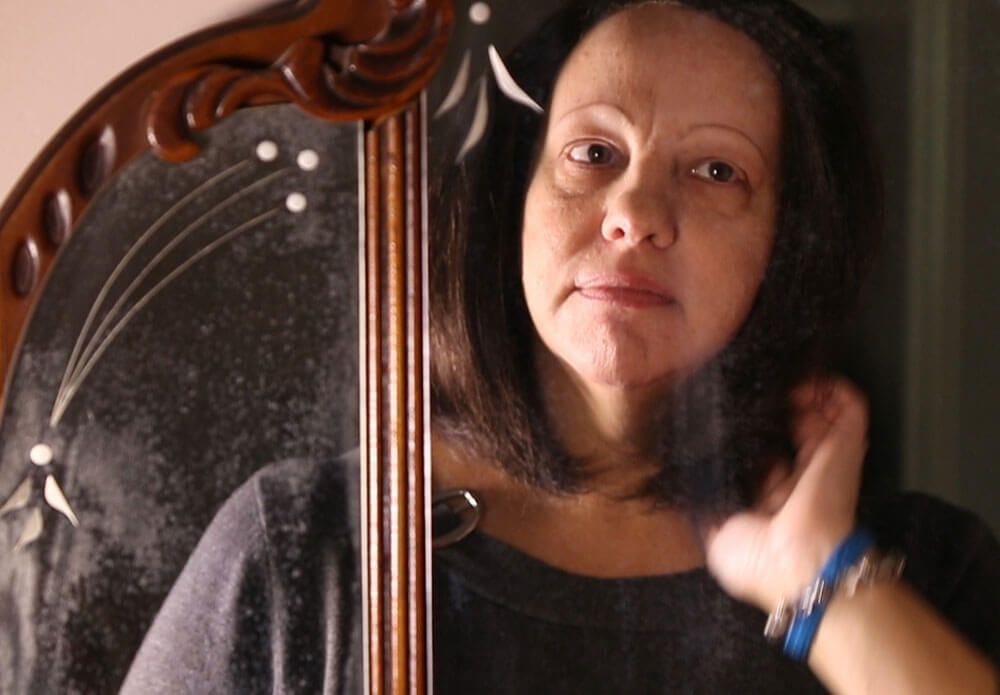Not Just Cosmetic: The Pain of Alopecia and the Search for A Cure

The phrase “only skin deep” implies that looks are superficial — and insignificant. But we regularly judge, and choose whether or not to connect with, other people based on how they look. That’s why the patchy hair loss experienced by sufferers of Alopecia areata (AA), an autoimmune disease, brings additional losses for patients: Possibly a loss of identity, or even a loss of contentment and wellbeing.
“I don’t want people to say, ‘Oh, it’s just hair,’” says Lisa Gregory, who suffers from a severe form of the disease called Alopecia universalis, which has left her completely bald and without eyelashes or eyebrows. “This is an emotional thing. And when your hair grows in, it’s great. You’re excited. But when it falls out, you’re devastated. This is the worst thing that’s ever happened to me.”
In the U.S., about 6.8 million men and women have Alopecia areata. Yuji Yamaguchi, senior director of clinical research at Pfizer, is a dermatologist by training who has treated many AA patients. “There are currently no FDA-approved treatments available,The currently available treatments for AA, such as corticosteroid injections, aren’t that effective and have bad side effects,” he says.
When the Body Turns on Itself
Alopecia is “not just skin deep” in another sense, too: It’s a consequence of an immune system gone haywire below the body’s surface. Alopecia is in a class of disorders called autoimmune diseases, all characterized by instances of the body attacking its own tissues and cells as if they were invaders. In alopecia, immune cells attack the base of the hair follicles, which makes hair fall out. The follicles then go into a dormant state and don’t produce new hair.
But what kind of immune cell is doing the damage, and how? For years, scientists didn’t know — which was a major barrier to discovering better treatments, says Yamaguchi. Then came a big breakthrough.
Clues in the Genes – and a Mystery Solved
In 2010, researcher Angela M. Christiano and her team at Columbia University Medical School compared the genes of about 1,000 AA patients to a control group and identified eight relevant regions of the genome. What was surprising about these genes is that they aren’t related to other autoimmune skin diseases, such as psoriasis. Instead, AA shares genes with rheumatoid arthritis, diabetes 1 and celiac disease. Existing drugs for these other conditions, then, provided researchers with new starting points toward researching potential treatments for AA.
In 2014, the Columbia team discovered the specific immune cells, cytotoxic T lymphocytes, and the main inflammatory signaling pathways responsible for attacking the hair follicles in people with AA. Further experiments conducted on investigational compounds that inhibit the Janus kinase (JAK) family of enzymes, known as JAK inhibitors, show this pathway may have a role as well.
The Emotional Fallout
As Gregory’s alopecia worsened, she isolated herself, shying away from friends and co-workers. Loneliness only exacerbated her fears and insecurities.
It’s a cycle that many AA sufferers seemingly go through: One study found that rates of depression, stress and neurosis are higher among AA sufferers than control subjects. “People with AA are more likely than others to report suicidal ideation,” adds Yamaguchi, who has had patients express such thoughts.
The link between hair and identity is stronger for women, making AA particularly hard for them. About 40 percent of women with alopecia report marital problems and about 60 percent say they have had career problems because of their condition.
Growing Hope
Pfizer is currently researching a potential treatment on patients with AA. “It inhibits a particular JAK pathway that has been shown to be important in Alopecia,” says Yamaguchi.
An FDA approved medicine would make a real difference for people like Gregory, who now leads a support group for other AA patients. It wouldn’t just change their appearance — it would change their lives.
